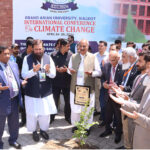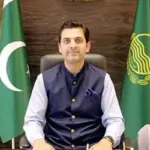ISLAMABAD, Mar 19 (APP):U.S. Assistant Secretary for Oceans and International Environmental and Scientific Affairs, Monica P. Medina has said that the governments of the United States (U.S.) and Pakistan have great room for working together on the Green Climate Fund (GCF) to solve climate challenges due to worst impacts of global warming and environmental degradation.
The U.S. Assistant Secretary for Oceans and International Environmental and Scientific Affairs in a discussion after the bilateral working group on climate and environment informed media men on the outcomes of the ministerial dialogue on important issues faced by Pakistan due to climate change.
Ms. Medina said, “One thing that we really need to work on together is with respect to the Green Climate Fund which is one of the largest fund donors of the projects to deal with climate change in the world, and that both Pakistan and US governments are going to co-chair the board of directors at the key moment when the countries are looking to get more funding from the Fund into the communities that are being hit hardest by climate change.”
She underlined that it was a tremendous opportunity for the US and Pakistan in particular to work together to help solve climate challenges now even as the entire conference of the parties (COP) process continued to deal with the loss and damage fund.
The U.S. Assistant Secretary said Pakistan is a very important partner and friend of the U.S., adding, “We have a very meaningful and a deep relationships with lots of people to people ties, strong bilateral exchanges and were working together on a huge range of global climate and environmental topics and challenges as these challenges we know hit close to home.”
The U.S. official said the world countries had faced horrible climate impacts but the devastating floods in Pakistan last year caught everyone’s attention.
“We worked closely with the Pakistani government in the wake of the floodings.
Since these terrible events, the U.S. have announced more than $200 million in flood relief, food security, disaster preparedness and other recovery efforts. We are very pleased to be able to do that as well as lending a lot of expertise too in trying to figure out ways to prevent and adapt to these sorts of climate stressors.
She added that the U.S. administration had realised that both the countries would have to move forward to mitigate climate crisis by working together.
The U.S. Special Presidential Envoy for Climate, John Kerry would have been here but his busy schedule did not permit him, she added.
Commenting on the Working Group proceedings, Ms. Medina said, “We not only had a climate dialogue but an environmental dialogue which allowed us covering a full range of topics including water resources, agriculture, nature and biodiversity, ocean conservation, and several others. It was very pleased to leave this working group together with the Minister for Climate Change Senator, Sherry Rehman here in Pakistan and our two governments had a long discussion about how we are going to strengthen our cooperation on climate and environmental issues.”
The U.S. Assistant Secretary said climate issues were interlinked and fundamentally related to one another, adding, “we can’t address climate crisis without talking about biodiversity and vice versa.”
She commended the efforts of U.S. Ambassador Donald Blome for devising a robust process for engagement of the Working Group. “We had a very wonderful mechanism for working on these issues helped by Ambassador Blome putting in place called Green Alliance Framework for work on climate, agriculture, water management and clean energy.
The U.S. Assistant Secretary had met with the Minister for Water Resources. She had also visited the biodiversity rich Margalla Hills National Park and saw the work of Islamabad Wildlife Management Board (IWMB).
She termed the IWMB as a model for other wildlife services. She appreciated the bear rehabilitation center and the Leopard Preserve Zone managed well by the IWMB.
She also appreciated the National University of Sciences and Technology (NUST) young scientists and commended the students for asking good questions.
She also met the young and called her interaction important with women at NUST who were very engaged and active to be part of the learning process.
She also met the programme alumni at the Embassy that had a huge one.
“They are very active in civil society, business and academia,” she acknowledged the U.S. Embassy program alumni.
She also met the representatives of the business community and civil society and was amazed to meet them
The United States Agency for International Development (USAID) and the Embassy work on looking the issue of climate change at the local level, she said.
Ms. Medina noted that plastic pollution issue was another important area where the U.S. government was engaged with it’s Pakistani counterpart.
“Pakistan had one marine protected area (MAP) and we are also working in this area to enhance Pakistan’s capacity to further boost it’s MAPs.”
She added that further areas of cooperation included illegal fishing, air quality, mangroves, impacts of floods and recovery issues and Climate Smart Agriculture to address impacts of environmental degradation, and management of 2023 monsoon floods.
The working group delegation, she informed that had a detailed presentation and commended that both the governments had engaged in a really pivotal moment at the global level.
Last year, she said, “I was pleased to represent my country at the Convention on Biodiversity conference in Montreal and the world got a successful landmark agreement. We had 40 hours detailed discussions to cover the uncovered water areas in high seas. We had a text in agreement to protect marine protected areas which did not exist before. This is half the planet that had no cross sectoral governance.
The world came closer on the times of very challenges.”
Discussing the plastic pollution issue, she said there was a great discussion on plastic and plastic pollution at the working group level.
“We are drowning in plastic waste. Some of the municipal and provincial governments of Pakistan are trying to meet this challenge. It’s an important part of the climate challenge. We are already looking forward for COP-28 to address numerous global challenge and how to utilise that global forum to advance our agenda on global level.”
She expressed her gratitude to Ambassador Blome for holding this delegation and making strides to make Green Alliance Framework and made the great friendship with Pakistani governments, interest groups, media and people .
Responding to a couple of queries from APP, U.S. Assistance Secretary Monica Medina said to discuss plastic pollution she was very pleased to be able to have with her at the Working Group meeting two representatives from the U.S. Development and Finance Cooperation.
There job is to find business solutions to solve the plastic pollution problems and find good business solutions, she said, adding, “They are very interested in solving plastic solution. They are very good options for building those kinds of business solutions as we needed those for addressing plastic pollution.”
Ms. Monica Medina said plastics are used for many things we are so dependent on as it was very important for keeping food safe and delivering water to areas of the world that have no access to water at their disposal.
“We know we need plastics for medical devices and for parts making cars more fuel efficient. Plastics cannot be completely eliminated from the system,” she said.
The U S. Assistant Secretary was pleased to see non-plastic (cotton or fabric made) carry bags in Islamabad and appreciated it was a solution to single use polythene bags.
“Your government is working hard to come up with solutions that are both workable at federal and provincial levels. In U.S., we don’t have a one single national law on plastic pollution that regulates plastics. We hope that this agreement will allow us to have both the prescriptive and more innovative bottom up solutions and there would be an agreement to allow national actions plans like the climate agreement so that the governments can have right solutions to match their challenges like islands have different problems and developing countries have different.”
She was excited to know that there are 6,000 plastic bags manufactures in Pakistan that the government had told to the U.S. delegation.
“It’s a very interesting place to try and take on this challenge. The solid waste management is an issue for your government and talked about it. It’s one of the six priority focus of the climate and environmental dialogue. We do know that Pakistan is very much impacted by climate change as our many other countries that haven’t been the part of making the problem.”
Replying to another query, she said, “We appreciate the very much need to assistance we are providing right now. It’s a just a hard thing to get enough funding as the floods devastation was tremendous. We know your agriculture is dependent on climate smart solutions.
So we talked a lot about it. We are prepared to bring a lot of expertise so that when you are working to solve this issue you do it in the right way.”
The U.S. government, she said had a big programme for adaptation and resilience that it was working with lots of developing countries.
She added that climate, energy transition, water resources and nature and biodiversity were all connected. “Our energy Assistant Secretary my counterpart was here for an energy dialogue and spent a lot of time on discussion on increasing renewables, make sure reliables, grid issues.”
One way to mitigate some of the climate change impacts witnessed was through nature based solutions, she added.
Climate Smart Agriculture, she said was a nature based solution to the climate problem to the extent that we are making your water use more efficient, bring better seeds and fertilizers.
“We announced big $4.5 million project on fertilizer cooperation this week. The ambassador announced that the other day and we had great discussions on it. Some of the other problems like solid food waste and a lot of burning agriculture waste interpreting into the climate problems are also part of discussions.
It’s a lost opportunity in terms of fertilizer and better agriculture practices. There is so much more that we can do and we are excited about all the good dialogue we had in specific ways. We can help with specific challenge in energy, water and agriculture,” she added.
One of the areas of expertise, she said the U.S. Working Group brought along with it was its water engineers. “The Army Corps of Engineers in the US government. We had a group of engineers who are part of our military.
They actually run our water systems and had very sophisticated models of hydrology, and how ice melt, ground water, rain can interact and create kinds of problems, what to do when the water is running short, particularly because they can look at the seasonality and they can check the boom and burst of water cycle here, very much helped to target agriculture sector water is used at the right time, so seeds are right to be able to adapt to the water needs at its seasons when they were needed.”
She added that they were very excited to able to share that knowledge with the Pakistani government.
“The agriculture and water ministries were very interested to help them implement the knowledge. Some of water systems are similarly inundated or dry in U.S. We had a lot of experience in dealing with these kind of problems. Our goal is not just to help funds but also to bring you the right expertise that the money you spent is spent in a way that makes sure agriculture is more productive,” Assistant Secretary Medina said.
“We will be looking ways to assist the living Indus initiative that we saw in the COP-27 Sharm El-Sheikh, Egypt. It is a way to think about many of your climate problems at the same time.
We had a very detailed presentation on the specific projects under that initiative where we can assist,” she said.
Ms. Medina mentioned that she was interested in mangroves and tree restoration work where the U.S. government had specific funds.
“We have been requested for assistance in managing forest fires and our agriculture department officers were here and were excited to assist in this regard. USAID programmes also looking at how to improve agriculture outcomes and we would like build on the similar.”
She added that on plastic pollution both the sides shared similar philosophy about how to solve the problems. “I think our governments working together can be very effective in the global negotiations to solve the plastic pollution,” she hoped.






